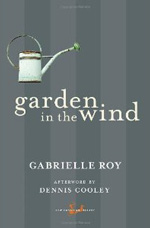
Garden in the Wind, a collection of four short stories by Gabrielle Roy, is what I like to call "a quiet book." I use this term to describe books where all the action is under the surface . . . there are no murders or torrid affairs, and certainly no chase scenes. Two bestselling books that I've also given this label to are Kazuo Ishiguro's The Remains of the Day and Ian McEwen's On Chesil Beach. In all three of these books, there is tremendous conflict, but it is silenced, subtle or unstated. Although life has knocked around all of Roy's characters, she shows their suffering with sensitive dignity, and it is this integrity that makes these stories special.
In writing this collection, Roy draws from her childhood experiences growing up in a small town in the Canadian prairies in the early twentieth century. All four of the empathetic stories centre on the lonely struggles of immigrants trying to create a new home. The stories are not connected, but all of them share the prairie itself as a character. The mythical proportions of the vast horizons, stark landscape, searing summer heat, harsh winter cold, and relentless winds serve to strengthen and contrast with the internal battles of the characters. Her use of land and nature places Roy's book firmly in the subcategory of Canadian literature known as "Prairie Realism." Here nature is immense and hostile; people are poor, friendless and bored; and "it is always circa 1935," to quote a literary critic.
In the first story, "A Tramp at the Door," the young narrator tells about a hobo who arrives at her family's Manitoba farm pretending to be a distant cousin from Québec. As the story unfolds, both the family and the reader learn that even a penniless tramp can have something valuable to give.
"Hoodoo Valley," the shortest story in the collection, tells of the frustrations of immigrants disappointed by the "too-vast exaggeration of land" they have found in the Saskatchewan prairie. In this case, the people are Doukhobors, pacifist Russians escaping persecution under the Tsarist regime. Doukhobors follow a communitarian lifestyle, and the group in this story is in search of a single place in which to settle the whole community. Their vision and dissatisfaction with the available options makes it clear that they are searching for a utopia that exists only in their collective imagination. In keeping with the Doukhobors' communitarian tradition, Roy writes the group as if it were one person, and not a cluster of individuals. Even the three leaders, Zibinov, Streliov and Strekov, speak, and are spoken of, as one person.
In the story "Garden in the Wind," Marta is an old immigrant woman who is "no longer quite Ukrainian but not quite Canadian either." She lives in isolation on a farm in northern Alberta with her brutish, non-verbal husband. Her children have assimilated into Canadian culture and disappeared to the south. In solace she nurtures a small, wonderful flower garden that grows in sharp contrast to the dusty beige prairie that surrounds it.
My favourite of the stories is "Where Will You Go, Sam Lee Wong," which I find to be the most complex and interesting of the collection. Sam escapes the overcrowding and anonymity of his life in China, and dreams of creating a better life in Canada. He hopes to find that life by running a greasy spoon diner in a small Saskatchewan whistle stop of a town. But there he discovers that he is anonymous too. In China he felt like everyone else, but in Canada he is like no one else, and the difference makes him invisible. He encounters racist attitudes from the townspeople who don't quite recognize him as human until it is too late.
Although Garden in the Wind was originally published in 1975, Roy had written some of the stories twenty years
earlier. In celebration of the fiftieth anniversary of the New Canadian Library, the publisher has reprinted and
repackaged this book now, along with many other titles. Gabrielle Roy, who was born in the francophone community of
St.Boniface, Manitoba in 1909 and died in Quebec City in 1983, is an icon of Canadian literature. Roy's compassionate
portrayals of human struggling in her writing earned her the Governor General's Award on three occasions.

New Canadian Library, paperback, 9780771094231
